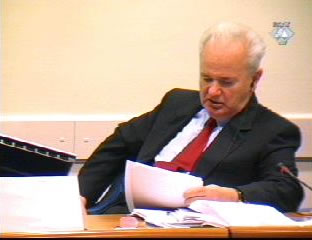Home
PROSECUTION AND AMICI CURIAE OPPOSE SEVERANCE IN THE MILOSEVIC CASE
Written motions in which the prosecution and the amici curiae present their views on possible severance of one or more indictments were made public today at the Tribunal. The prosecution's view is that severance would be an "incorrigible mistake" while in the opinion of the amici curiae it would "prejudice the accused."
 Slobodan Miloševic during the cross examination
Slobodan Miloševic during the cross examination For different reasons, both the prosecution and the amici curiae consider that the trial of Slobodan Milosevic should continue as a "single case" rather than be severed into separate cases for Kosovo, Bosnia and Herzegovina and Croatia.
Written motions in which the prosecution and the amici curiae present their views on possible severance of one or more indictments were made public today at the Tribunal. The motions were submitted at the request of the Trial Chamber, as part of the "radical review" of the Slobodan Milosevic trial and its future conduct.
The amici curiae consider that the severance of the trial at this stage of the proceedings would be prejudicial to the accused, since the prosecution treated the allegations from the three indictments against Slobodan Milosevic as a "single case". In the opinion of the amici curiae, if the case were to be severed, Milosevic would be denied the opportunity to challenge to a full extent all the allegations and evidence presented by the prosecution. Any severance would also require Milosevic to reorganize his defense substantially, resulting in further delays. If the judges decide to sever despite these reasons, the amici curiae propose that Milosevic begin his case with the presentation of evidence related to the Kosovo indictment, and to be granted 150 days to do so. The Chamber has granted him a total of 150 days for the presentation of evidence related to all three indictments.
In the opinion of the prosecution, severance would be an "incorrigible mistake". The problems that have forced the Chamber to carry out "radical review" of the course and future conduct of the trial are for the most part the result of the conduct of the accused, primarily of his insistence to defend himself, the prosecution states. Thus the accused has caused his health, already quite bad, to deteriorate even further and wreaked havoc with the trial schedule. The only reasonable solution – both as regards the health of the accused and the unimpeded continuation of the trial – would be to assign counsel to the accused, not to sever the case into two or three separate proceedings.
The prosecution notes that the request of the Chamber might be the result of the concern that a single trial on all three indictments might never be brought to an end, "for one reason or another." In that case, it might seem desirable to deliver "at least one judgment" on one or two indictments, then to risk having "no judgment at all". In the view of the prosecution, however, this approach is "premature" and based on "speculations and giving too much weight to the impressions, rather than reality." According to the prosecution, the actual procedure to establish facts and create a historical record about the past events is just as important, if not even more important than the judgment itself.
If the case were to be severed and if the trial were to continue on only one indictment, the prosecution contends, there would inevitably be no trial on the remaining indictments; the historical record would thus remain incomplete.
If the Chamber nevertheless decides to sever, the prosecution notes that the trial should continue chronologically, in the order in which the events unfolded: the Croatia and Bosnia and Herzegovina indictments should be tried first, followed by Kosovo, if this stage is reached at all.
Linked Reports
- Case : Milosevic Slobodan - "Kosovo, Croatia and Bosnia"
- 2004-07-21 CASES AGAINST MILOSEVIC TO BE SEVERED AGAIN?
- 2004-07-15 THE PROCEDURE FOR THE ASSIGNMENT OF DEFENCE COUNSEL FOR MILOSEVIC SPEEDED UP
- 2004-07-06 PROCEDURE TO APPOINT DEFENSE COUNSEL FOR MILOSEVIC SET IN MOTION
- 2004-08-25 MILOSEVIC TO START HIS CASE ON 7 SEPTEMBER
- 2004-08-31 MILOSEVIC'S "TRUTH" ABOUT EVENTS IN FORMER YUGOSLAVIA
- 2004-09-01 DECISION ON LEGAL COUNSEL DUE TOMORROW
